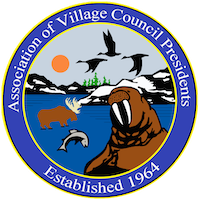Association of Village Council Presidents (AVCP) Director of Natural Resources Jennifer Hooper called for immediate action to combat the salmon shortage in our region. Today, Hooper provided the following testimony at the North Pacific Fishery Management Council meeting in Sitka, Alaska.
Testimony of Jennifer Hooper:
Madam Chair and members of the Advisory Panel,
My name is Jennifer Hooper, and I am here speaking on behalf of the Association of Village Council Presidents. AVCP is the tribal consortium of the Yukon-Kuskokwim Delta in Western Alaska with 56 federally recognized Tribes. We work with our Tribes to provide services to the 27,000 residents of the region. Our comments today are on Salmon and agenda item D1.
AVCP has provided testimony to the Council in the past, urging action to reduce the levels of salmon bycatch in the Bering Sea to support stocks in Western Alaska a chance to recover. In 2021, we shared the critical importance of salmon to the communities in our region and described how in 2020 and again in 2021, our families on the Kuskokwim and Yukon were restricted from subsistence fishing. For those families on the Yukon River, the disastrous returns of Chinook salmon were compounded by the unprecedented record low return of summer chum and fall chum. The river was closed from ice-out for the entire season. There was no economic opportunity from very modest commercial fisheries but, even more critical, people were not able to harvest salmon for food. Families – parents and grandparents, children, and grandchildren – were denied the essential cultural and spiritual connection to the salmon. There was no opportunity to go to fish camp, no opportunity to teach and to learn the long-held ways and traditions of harvesting and processing salmon.
I would like to highlight a few tables in ADFG’s WAK chum & Chinook salmon stock status report that summarize 2020 and 2021. What is the level of abundance for every single chum salmon stock listed from the Nushagak to Kotzebue? Below average. What is the level of abundance for every single Chinook salmon stock from the Nushagak to Norton Sound? Below average. What do you imagine the tables will say for 2022 in next year’s report? With the reports provided and knowing that the Yukon River is closed with no subsistence fishing projected and the Kuskokwim River closed with very limited subsistence fishing opportunities – a pretty good guess would be below average.
Who do these below average salmon stock abundances really fall on? They fall on the shoulders of every single one of our fishing families. There is an overwhelming certainty of food insecurity for families in the YK Delta and throughout Western Alaska. We stated before that it was going to be agonizing to imagine the struggles our families were going to face when winter came … compound that with another year of the same worries, the same anxieties, the same empty fish camps, and empty freezers. Just imagine what even a few more fish would mean.
Recommendations to implement:
- Move to apply a lower cap on Chinook salmon and to set an effective cap on chum salmon. We recognize the importance of research and understanding how other things are affecting our returning salmon but, we don’t have time to wait until we have all the answers – it is critical to reduce salmon bycatch now. We have advocated for zero bycatch before. It may not be palatable but, it must be the ultimate goal of everyone – any waste is unacceptable. We all know that mandates and incentives (and caps and closures) can be pretty motivating reasons for compliance and ingenuity.
- Utilize the thousands of years of knowledge and experience that we hold and bring us into your process. A true collaborative approach fosters consultation, includes Indigenous Knowledge, and invites participation and partnerships. Grant the respect and inclusion of tribes in your decision making. The foundations of our processes are holistic and center on preservation and safeguarding resources for those who will come after us.
A year ago, we stressed that any commercial fishery must be managed in a way that prioritizes the sustainability of the resource and factors in every level of impact they have on other things – whether it’s the ecosystem, other fisheries, or the waste of bycatch. We respectfully request that you take action to support and forward these recommendations to the Council.
To close, I’ve mentioned these words before but, they still have such significance. An elder from our region once told us, “We don’t have a word for “waste” in our language.” He reminded us that “the fish are our inheritance…we have to do something to conserve, otherwise we are going to be the ones to tell stories to our grandchildren about the beautiful salmon we used to catch.”
Thank you.






